Conversational AI is transforming e-commerce by offering customers personalized help whenever and wherever they need it.
Powered by advanced technologies, chatbots, and virtual assistants are changing how businesses engage with shoppers.
They can answer questions quickly, tailor product recommendations, and help shoppers checkout easily.
This new form of artificial intelligence creates seamless shopping experiences that keep customers returning for more.
In this comprehensive guide, we'll explore how leading companies implement conversational AI to boost sales, increase customer satisfaction, and gain a competitive edge in the marketplace.
So get ready to discover the game-changing potential of e-commerce chatbots and virtual assistants in e-commerce!
Let us start with knowing about what conversational AI is.
What is Conversational AI?
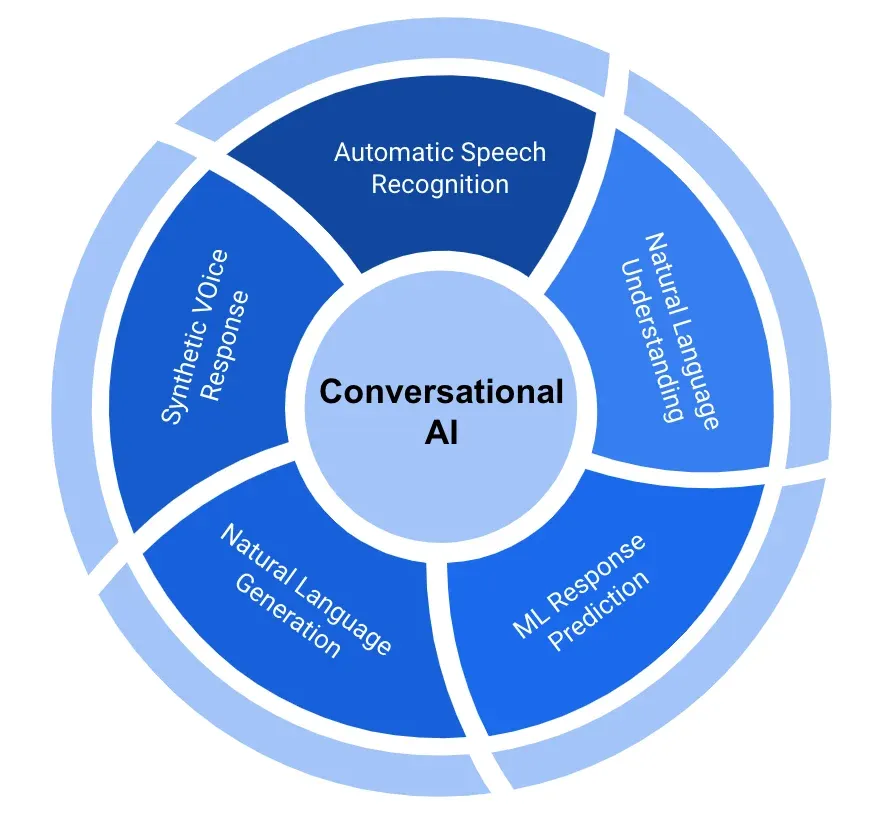
Conversational AI, also known as conversational artificial intelligence, is a technology that enables computers and machines to communicate with people through conversation organically.
It understands and replies to human inquiries using approaches comparable to how people interact, such as Natural Language Processing (NLP) and Machine Learning (ML).
This technology tries to conduct conversations and respond to queries in the same way that humans do.
Conversational AI seeks to understand human-spoken language and respond appropriately through powerful algorithms and neural networks.
Importance of Conversational AI in E-commerce
Conversational AI has emerged as a game-changer for the e-commerce industry.
It has changed how businesses interact with customers, helping them deliver seamless, personalized experiences.
E-commerce chatbot enables e-commerce companies to provide instant support, understand customer preferences, and offer tailored recommendations.
By incorporating Conversational AI, e-commerce businesses can enhance customer engagement, increase sales, and gain a competitive edge in the market.
Benefits of Implementing Conversational AI in E-commerce
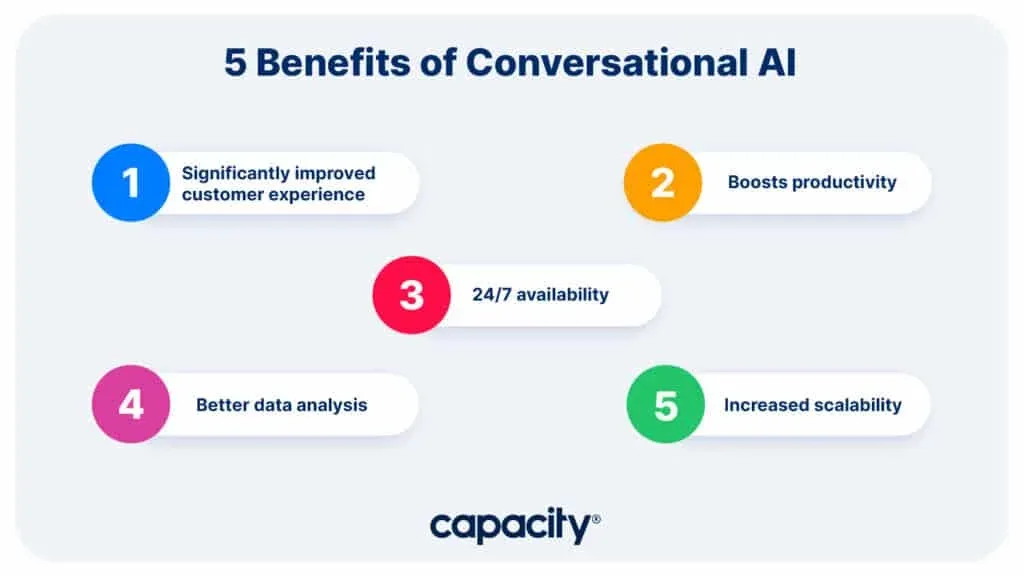
Conversational AI elevates e-commerce through enhanced engagement, 24/7 support, personalized recommendations, streamlined transactions, and impactful insights.
As virtual assistants guide customized buying journeys, they boost satisfaction, loyalty, and revenues.
Read on to discover how chatbots and AI transform the shopping experience by providing the right information at the right time during critical moments.
Enhanced Customer Engagement and Satisfaction
Conversational artificial intelligence (AI) tools like chatbots and virtual assistants allow E-commerce companies to interact with their clients in real-time. They may answer client questions, provide product suggestions, and aid with order monitoring, all through chat. Businesses may significantly boost consumer happiness and loyalty by providing a personalized and engaging purchasing experience.
24/7 Customer Support
With an e-commerce chatbot, e-commerce businesses can handle customer support being limited by human availability. Chatbots and virtual assistants can provide round-the-clock assistance, ensuring that customers get their queries resolved at any time. This availability increases customer trust and reduces response time, resulting in higher customer satisfaction rates.
Personalized Recommendations
Conversational AI platforms have powerful algorithms that can analyze customer preferences and behavior. By understanding customer needs, e-commerce chatbots can provide personalized product recommendations. This level of personalization increases the likelihood of a purchase and improves the overall customer experience.
Streamlined Order Placement and Tracking
Conversational AI streamlines the order placement process by guiding customers through the necessary steps. Customers can talk with an e-commerce chatbot or virtual assistant to place an order, track its progress, and receive updates. This automation eliminates friction points in the buying journey, resulting in smoother transactions and higher customer satisfaction.
Cost and Time Efficiency
One of the significant benefits of implementing Conversational AI in e-commerce is the cost and time savings it offers. By automating customer support and frequently asked questions (FAQs), E-commerce businesses can reduce the workload on their support teams and allocate resources more efficiently. Moreover, Conversational AI can handle multiple conversations simultaneously, reducing response time and enhancing efficiency.
Data Collection and Insights
Conversational AI tools generate valuable data about customer interactions, preferences, and buying patterns. E-commerce businesses can leverage this data to gain insights into customer behavior, identify trends, and make data-driven decisions. By understanding customer preferences, businesses can further personalize their offerings and improve their marketing strategies.
Now, we will see how conversation AI works in e-commerce.
How Conversational AI Works in E-commerce?
E-commerce chatbot has emerged as a powerful technology in e-commerce that changes the way businesses interact with their customers.
It enables computers and machines to engage in natural and conversational conversations, mimicking human-like interactions.
This section will explore how Conversational AI works, the underlying technology, and how it can be integrated into e-commerce websites and mobile apps.
The technology behind Conversational AI
Conversational AI relies on advanced technologies such as Natural Language Processing (NLP) and Machine Learning (ML) to understand and respond intelligently to human queries.
NLP allows the system to analyze, interpret, and generate human language, while ML algorithms enable the system to learn and improve over time based on user interactions and feedback.
The technology behind Conversational AI involves various components, including speech recognition, natural language understanding, dialogue management, and response generation.
Speech recognition converts spoken language into written text, while natural language understanding helps the system extract meaning and intent from user input.
Dialogue management handles the flow of conversation, maintaining context and guiding the interaction, and response generation generates accurate and contextually relevant responses.
Conversational AI Platforms and Tools for E-commerce
Several conversational AI platforms and tools can be utilized to implement conversational AI in e-commerce.
These platforms offer pre-built models, APIs, and frameworks to streamline development.
Some popular Conversational AI platforms include IBM Watson Assistant, Google Dialogflow, Amazon Lex, and Microsoft Bot Framework. These platforms allow e-commerce businesses to create chatbots and virtual assistants with ease.
They provide tools for training the AI models, managing dialogue flow, integrating with external systems, and deploying chatbots across multiple channels, such as websites, mobile apps, and messaging platforms.
Additionally, these platforms often come with analytics and reporting capabilities, allowing businesses to track and measure the performance and effectiveness of their Conversational AI implementations.
Suggested Reading:
Integration of Conversational AI in E-commerce Websites and Mobile Apps
Integrating Conversational AI into e-commerce websites and mobile apps is crucial for delivering a seamless and personalized customer experience.
There are several ways to achieve this integration, depending on the specific requirements and technologies used.
For E-commerce websites, businesses can embed e-commerce chatbot widgets or virtual assistant interfaces directly on their web pages.
These chatbots can be designed to handle various tasks, such as answering common customer queries, providing recommendations, assisting with product searches, and facilitating the order placement process.
By integrating Conversational AI, businesses can enhance customer engagement, reduce friction in the buying journey, and provide instant support.
Now, we will see the types of conversational AI in e-commerce.
Suggested Reading:
Types of Conversational AI in E-commerce
Conversational AI rapidly transforms e-commerce, enabling businesses to provide personalized and interactive customer experiences.
Several types of Conversational AI are available, each serving a specific purpose and delivering unique benefits.
This section will discuss the different types of Conversational AI in e-commerce and their applications.
Chatbots

Chatbots are the most common type of Conversational AI in e-commerce. They are computer programs that can simulate human-like conversations with customers via text or voice.
Chatbots can be deployed on websites, mobile apps, and messaging platforms, providing round-the-clock support and assistance to customers.
There are two types of Chatbots: Rule-based and AI-powered.
Rule-based Chatbots
Rule-based Chatbots operate based on a pre-defined set of rules and logic. These Chatbots are programmed to follow a specific script and can only respond to user inputs that match their pre-defined rules. Rule-based Chatbots are generally simpler to develop and maintain, making them ideal for businesses with limited resources or requiring essential support functions.
AI-powered Chatbots
On the other hand, AI-powered Chatbots utilize advanced technologies like NLP and Machine Learning to understand and interpret user inputs. They can analyze natural language and generate contextually relevant responses, improving the quality of conversation and user experience. AI-powered Chatbots require more resources and expertise to develop but offer greater flexibility and customization options.
And beginning with AI-powered solutions for your business isn't that tough. Meet BotPenguin, the home of chatbot solutions.
From custom development to integrating the new-age wonder ChatGPT, BotPenguin excels in developing chatbots that suit your custom needs.
- Whitelabel ChatGPT
- Hire ChatGPT Developers
- Custom ChatGPT Plugins
- Hire Chatbot Developers
- Custom Chatbot Development
- ChatGPT Clone
- ChatGPT Consultant
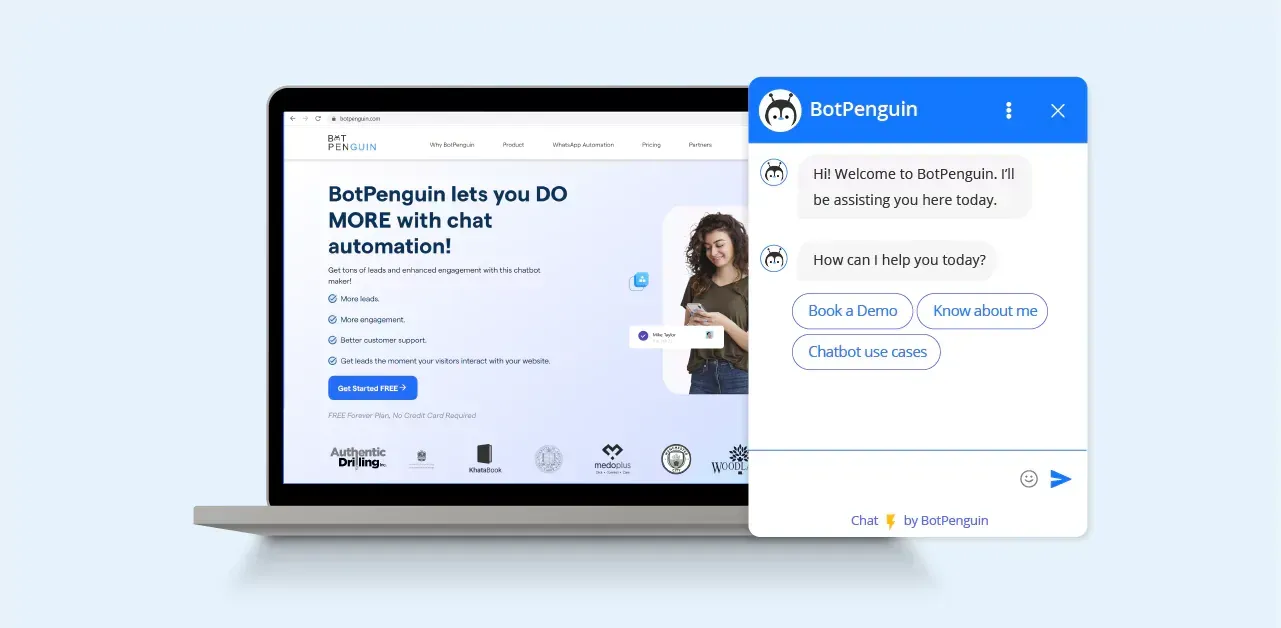
Virtual Assistants
Virtual Assistants are another type of Conversational AI in Ecommerce.
They are more sophisticated than Chatbots, which can handle complex interactions and provide more personalized support.
Virtual Assistants can operate via text or voice, using AI technologies to understand user inputs and context.
There are two types of Virtual Assistants: Voice-based and Text-based.
Voice-based Virtual Assistants
Voice-based Virtual Assistants allow users to interact with e-commerce businesses using voice commands and natural language. These Virtual Assistants employ voice recognition technologies to understand user inputs and can assist with placing orders, tracking deliveries, and answering queries. Voice-based Virtual Assistants can be integrated with smart devices like Amazon Alexa or Google Home, enhancing the convenience and accessibility of e-commerce shopping.
Text-based Virtual Assistants
Text-based Virtual Assistants interact with customers via text-based messaging platforms like Facebook Messenger, WhatsApp, or WeChat. They employ NLP and other AI technologies to understand and interpret natural language inputs. Text-based Virtual Assistants can provide personalized support and assistance, making it easier for customers to get the information they need quickly and easily.
After looking into the types, we will see some use cases of conversational AI in e-commerce.
Suggested Reading:
Use Cases of Conversational AI in E-commerce
Conversational AI has numerous applications in e-commerce. Some of the most common use cases of Conversational AI in E-commerce are listed below. Scroll down and read.
Customer Support and FAQs
E-commerce chatbots and Virtual Assistants can efficiently handle customer queries and support functions, reducing the burden on human support teams and enhancing the customer experience.
By automating routine and frequently asked questions, businesses can improve response times, reduce wait times, and provide customers with quick and accurate solutions.
Product Recommendations and Personalization
By analyzing customer behavior, preferences, and purchase history, Virtual Assistants and Chatbots can provide personalized product recommendations, discounts, and offers, increasing the likelihood of purchase and customer loyalty.
Moreover, e-commerce chatbots and Virtual Assistants can assist customers in finding the products they are looking for and provide detailed information about the products, improving the overall shopping experience.
Order Placement and Tracking
Virtual Assistants and e-commerce chatbots can assist customers in placing orders, making the process more streamlined and efficient. Additionally, they can provide:
Order status updates and tracking information.
Improving transparency.
Reducing the anxiety associated with waiting for a delivery.
Inventory Management and Stock Updates
Chatbots and Virtual Assistants can update customers on the stock availability of products, providing real-time information and preventing out-of-stock situations.
This capability ensures that customers can make informed decisions and helps businesses manage their inventory more effectively.
Cross-selling and Upselling
Chatbots and Virtual Assistants can suggest complementary products or upgrades that customers might be interested in, leading to cross-selling and upselling opportunities.
This approach increases businesses' average order value and revenue while providing customers with a more comprehensive and holistic shopping experience.
After the application, there are some of the best practices for implementing conversation: AI in e-commerce.
Best Practices for Implementing Conversational AI in E-commerce
Conversational AI has changed how businesses interact with their customers in the e-commerce industry.
Using advanced technologies such as chatbots and virtual assistants, businesses can provide personalized and engaging customer experiences, ultimately driving customer satisfaction and loyalty.
However, implementing Conversational AI requires careful planning and execution. This section will discuss the best practices for implementing conversational AI in e-commerce.
Understanding Customer Needs And Preferences
To implement Conversational AI in e-commerce successfully, it is crucial to understand the needs and preferences of your target audience.
Conduct thorough market research, analyze customer feedback, and track customer behavior to gain insights into what your customers expect from Conversational AI solutions.
By understanding their pain points and expectations, you can tailor the implementation of Conversational AI to meet their specific needs, enhancing their overall experience.
Crafting Personalized And Engaging Conversations
One of the key advantages of Conversational AI is its ability to provide personalized customer interactions.
Ensure that your Conversational AI solution can analyze customer data, such as browsing history, purchase behavior, and preferences, to deliver relevant and timely recommendations.
Craft the conversations conversationally, using friendly and engaging language to make the customer experience more enjoyable. Inject personality and humor to create a memorable and unique experience.
Seamlessly Integrating Conversational AI with Existing Systems
For successful implementation, it is essential to seamlessly integrate Conversational AI with existing systems, such as customer relationship management tools, inventory management systems, and order fulfillment systems.
This integration allows for real-time access to relevant data and enables the Conversational AI solution to provide accurate and up-to-date information to customers.
The integration should be smooth and seamless, ensuring a consistent and seamless experience across all touchpoints.
Continuous Monitoring And Improvement Of The Conversational Experience
Implementing Conversational AI is an ongoing process that requires continuous monitoring and improvement.
Regularly monitor customer interactions and gather feedback to identify gaps or issues in the conversational experience.
Use analytics tools to track usage patterns, user satisfaction scores, and conversation success rates. Based on this data, make necessary improvements to the Conversational AI solution to enhance its performance and address any pain points.
Regular updates and improvements will ensure your Conversational AI solution stays relevant and valuable to your customers.
There is one leading platform that builds the perfect chatbot for your business; let us explore it in the next section.
BotPenguin's Conversational AI Chatbot for E-commerce
Businesses need innovative solutions to connect with customers and provide exceptional experiences.
BotPenguin's Conversational AI Chatbot is a powerful tool designed specifically for e-commerce businesses to enhance customer interactions and drive conversions.
Let's explore the features and benefits of BotPenguin's Conversational AI Chatbot for Ecommerce.
Intelligent and Responsive Communication
BotPenguin's Conversational AI Chatbot uses advanced technologies such as Natural Language Processing (NLP) and Machine Learning (ML) algorithms.
This enables the Chatbot to understand and interpret user inputs, making the conversation natural and responsive.
Customers can communicate with the Chatbot using text or voice, and the Chatbot can provide accurate and contextually relevant responses.
Personalized Product Recommendations
The Chatbot analyzes customer behavior, preferences, and purchase history to deliver personalized product recommendations.
By understanding each customer's unique needs, the Chatbot can suggest the most relevant products, increasing the likelihood of a sale.
This personalized approach enhances the customer experience and boosts customer satisfaction.
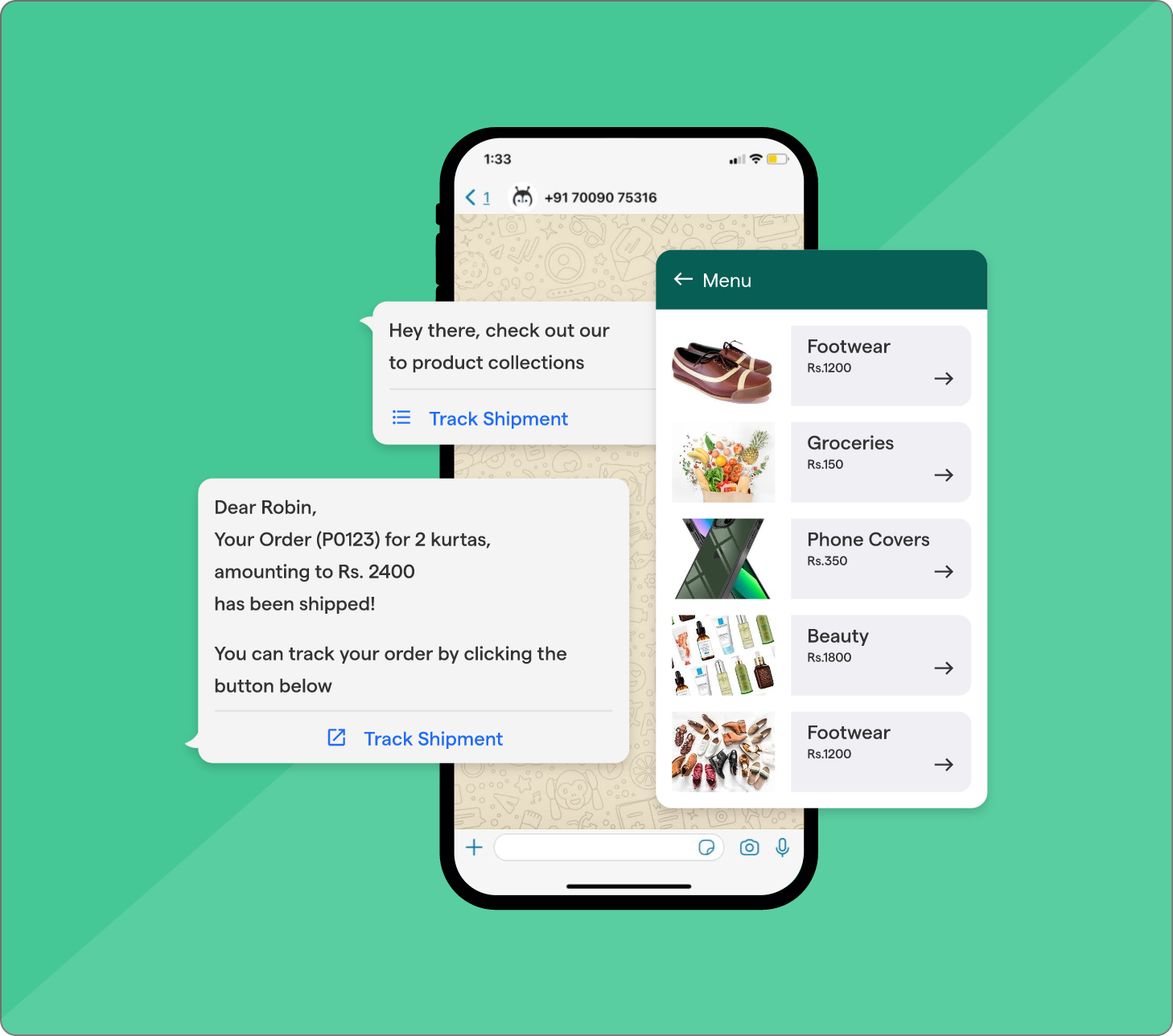
24/7 Support and Assistance
With BotPenguin's Conversational AI Chatbot, businesses can provide round-the-clock support to their customers.
The Chatbot is available 24/7 to answer customer queries, provide information about products and services, and assist in ordering.
This ensures that customers can get the help they need anytime, improving customer satisfaction and reducing the burden on human support teams.
Seamless Integration with E-commerce Platforms
BotPenguin's Chatbot seamlessly integrates with popular e-commerce platforms such as Shopify, WooCommerce, and Magento.
This integration allows real-time access to product information, inventory updates, and order management systems.
The Chatbot can provide customers with accurate product details, stock availability, and order status, leading to a streamlined and efficient shopping experience.
Easy Customization and Branding
BotPenguin's Conversational AI Chatbot can be easily customized to match the branding and personality of the e-commerce business.
Businesses can choose the Chatbot's name, appearance, and language style to create a cohesive and on-brand customer experience.
This customization helps businesses establish a strong brand presence and improve customer recognition and loyalty.
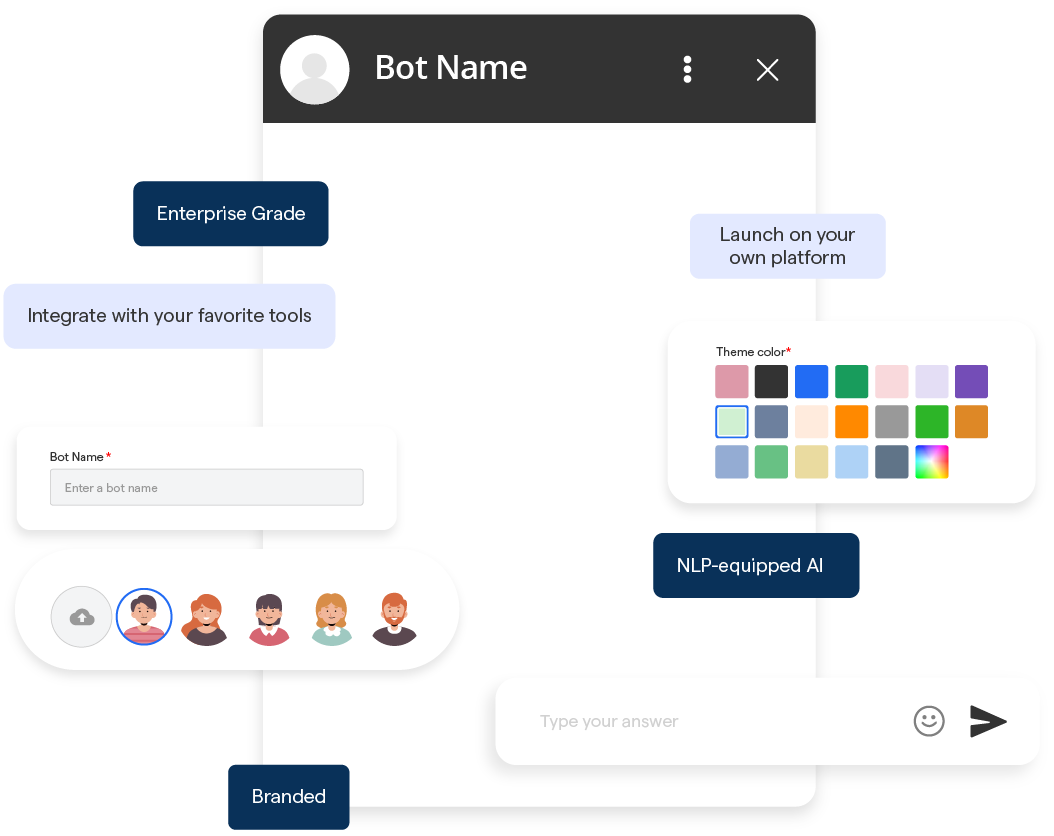
Continuous Improvement and Analytics
BotPenguin's Conversational AI Chatbot has powerful analytics and reporting capabilities.
Businesses can track user interactions, conversation success rates, and customer satisfaction scores to gain valuable insights into customer preferences and pain points.
With this data, businesses can continuously refine and improve the Chatbot's performance, ensuring optimal results.

Cross-Platform Availability
The BotPenguin chatbot is available across platforms like websites, mobile apps, Facebook Messenger, WhatsApp, etc. This omnichannel presence allows customers to access the chatbot conveniently through their preferred platform.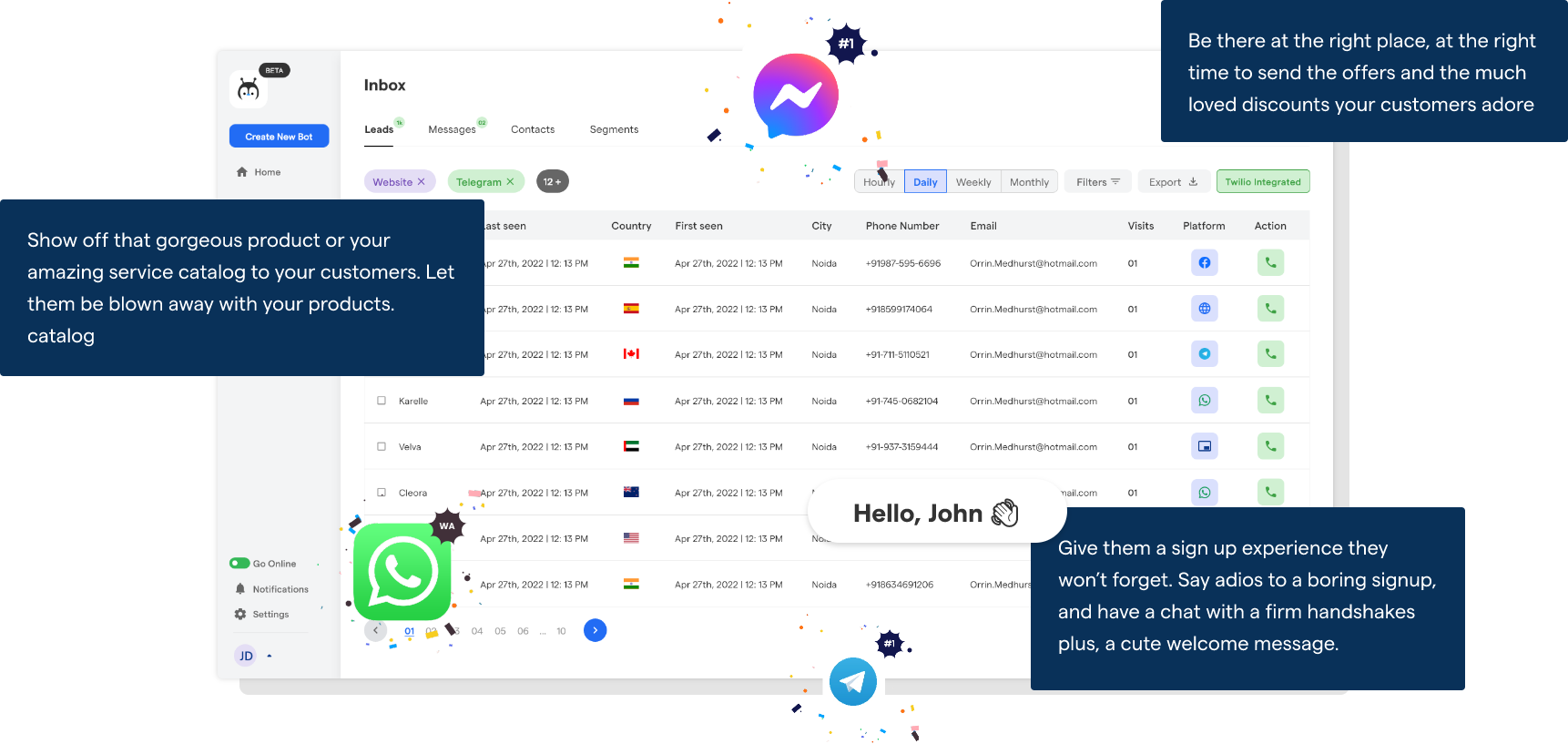
Multi-Lingual Support
The BotPenguin chatbot has multi-lingual capabilities and can understand customer queries in different languages. This allows businesses to provide localized customer support and scale to international markets.
Intent Recognition and Dialog Management
The BotPenguin chatbot uses advanced NLP to detect customer intent and manage the conversation flow with dialog scripts. This enables dynamic and context-aware conversations that resolve customer issues efficiently.
Conclusion
Conversational AI is changing the way we shop online.
Chatbots and virtual assistants give customers personalized, 24/7 support just a message away. This changes their shopping experience for the better.
Businesses see benefits, too. AI assistants mean lower costs and happier customers. They help businesses sell more by recommending products to the right people. Data from conversations also gives insights to keep improving.
If you want to enhance customer service while saving money, conversational AI is a must.
AI Chatbot Platforms like BotPenguin can help you build chatbots that do it all. Our bots understand customers, provide seamless support across channels, and integrate with your existing systems.
Most importantly, Our bots keep learning to give you an edge over competitors. Don't fall behind - start conversing with customers through AI today.
Suggested Reading:
Frequently Asked Questions (FAQs)
What role does conversational AI play in reducing ecommerce customer service costs?
Conversational AI reduces costs by automating routine inquiries, handling a large volume of customer queries simultaneously, and allowing human agents to focus on complex issues, optimizing resource utilization.
How secure is the data shared during interactions with conversational AI in ecommerce?
Top-tier e-commerce chatbot systems prioritize data security by using encryption, complying with data protection regulations, and implementing robust measures to safeguard sensitive customer information.
Can conversational AI personalize recommendations based on user preferences?
Yes, it utilizes machine learning algorithms to analyze user behavior, past interactions, and purchase history, enabling personalized product recommendations tailored to individual preferences.
What ecommerce platforms can integrate conversational AI solutions?
Conversational AI can integrate with various ecommerce platforms like Shopify, Magento, WooCommerce, and others, offering flexibility for businesses to implement these solutions regardless of their platform choice.
How can conversational AI assist in reducing ecommerce cart abandonment rates?
AI-driven chatbots can guide users through the purchasing process, provide additional information, offer discounts, or address concerns in real-time, reducing uncertainties and minimizing cart abandonment rates.
What are the key factors to consider when choosing a conversational AI solution for ecommerce?
Factors include scalability, customization options, integration capabilities, language support, analytics features for insights, AI training capabilities, and seamless user experiences across devices for optimal performance.


